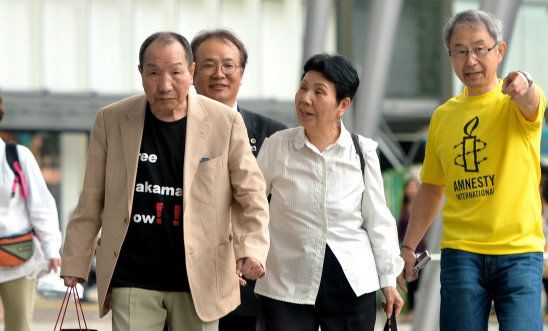
Hakamada Iwao

Hakamada is 87. He holds the record for being the world's longest-serving death row prisoner. He is temporarily released and awaiting a retrial in Japan.
Awaiting retrial after 46 years on death row
On 27 March 2014 Hakamada was temporarily released from Japan's death row and solitary confinement, as Shizuoka District Court granted him a retrial based on new DNA evidence. The prosecution challenged the District Court's decision to retry him by lodging an appeal, but Supreme Court judges directed the high court to reconsider and in March 2023 this led to the ruling that a retrial should now go ahead.
Hakamada spent 48 years imprisoned, and has serious mental health problems after living with the threat of his execution every day - Japan gives its prisoners no forewarning of their execution - many find out just minutes before they are hanged. This is outrageous.
Thank you to the nearly 22,000 of you who signed our petition calling on prosecutors to drop their appeal against his retrial. We hope that the retrial will soon mean that Hakamada may experience justice that is more than half a century overdue.
The back story: Hakamada's case
There are many reasons that Hakamda should be granted a retrial.
Arrested without evidence
In 1966 Hakamada was a factory worker in his thirties living in Shimizu, a city in the Shizuoka Prefecture on Japan's Honshu Island. He'd not long retired from a career as a featherweight boxing champion (he had ranked sixth in Japan) and was working for a miso-producing factory, when he was arrested over the suspicious deaths of a family of four. The manager of the factory where Hakamada worked had been murdered along with his wife and two children. The family was robbed, their bodies left in the house, and the house set alight.
The finger was pointed at Hakamada, and on 18 August 1966 he was arrested and detained in a police cell. He has never left custody since.
Tortured in detention
Hakamada was interrogated for 20 days with no lawyer present. The confession Hakamada signed at the end of his detention would form the basis of his conviction.
Later, Hakamada retracted his statement, claiming that police had coerced him into signing it after nearly three weeks of intensive interrogation, where he says he was beaten, threatened and forced to confess.
Police used faked signed confessions
Hakamada was brought before Shizuoka District Court on 11 September 1968. In the courtroom, Hakamada retracted the confession obtained by police during his detention.
The evidence was questionable: of 45 documents presented by the prosecution as signed confessions by Hakamada, only one was accepted by the judges as being legitimately signed by Hakamada in free will; the other 44 were dismissed. Despite this, he was found guilty of the four murders and sentenced to death.
Judge at Hakamada's trial believes he is innocent
'Since I had convicted him, I felt extremely guilty that I had to sentence an innocent man. I still do, to this day.'
Kumamoto Norimichi, Hakamada's judge
Kumamoto Norimichi was one of three judges on Hakamada’s case. He was appointed to be the main associate judge who wrote the final sentence. During the trial, he did not believe there was enough evidence to convict Hakamada of the murders.
'Looking at the evidence, there was almost nothing but the confession, and that had been taken under intense interrogation.'
Kumamoto put this to the other two judges, who disagreed. 'I was unable to convince the other two judges that Hakamada was not guilty, so I had to sentence him.'
His decision haunted Kumamoto: 'I could not bear the burden of conscience so six months later I had to resign as a judge.'
Forty years later, Kumamoto spoke about Hakamada’s case to the UN. He still maintains that Hakamada is innocent, and believes that he should not have been sentenced to death on such scant evidence.
'In cases where strong doubts exists over the guilt or innocence… If the prisoner is executed, the damage cannot be reversed.'
Kumamoto Norimichi
Not enough evidence to execute
International laws around use of the death penalty make it clear that anyone sentenced to death must have received a thorough and fair trial with undisputed evidence for their conviction.
‘Capital punishment may be imposed only when the guilt of the person charged is based upon clear and convincing evidence leaving no room for an alternative explanation of the facts.’
UN Economic and Social Council (ECOSOC) Resolution 1984/50
The Death Penalty
At Amnesty International, we firmly believe that no one – including any government – has the right to take away someone else’s life.
We oppose the use of the death penalty in every single case. No matter what the crime, who the alleged criminal is, or the method proposed to execute them – we will always stand against it.
We’re working to end the use of the death penalty around the world, and won’t stop until every country in the world has abolished it.
Find out more here.